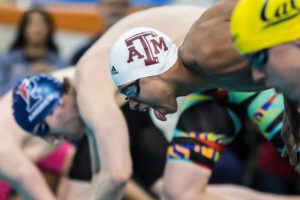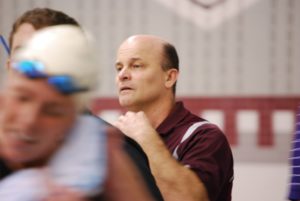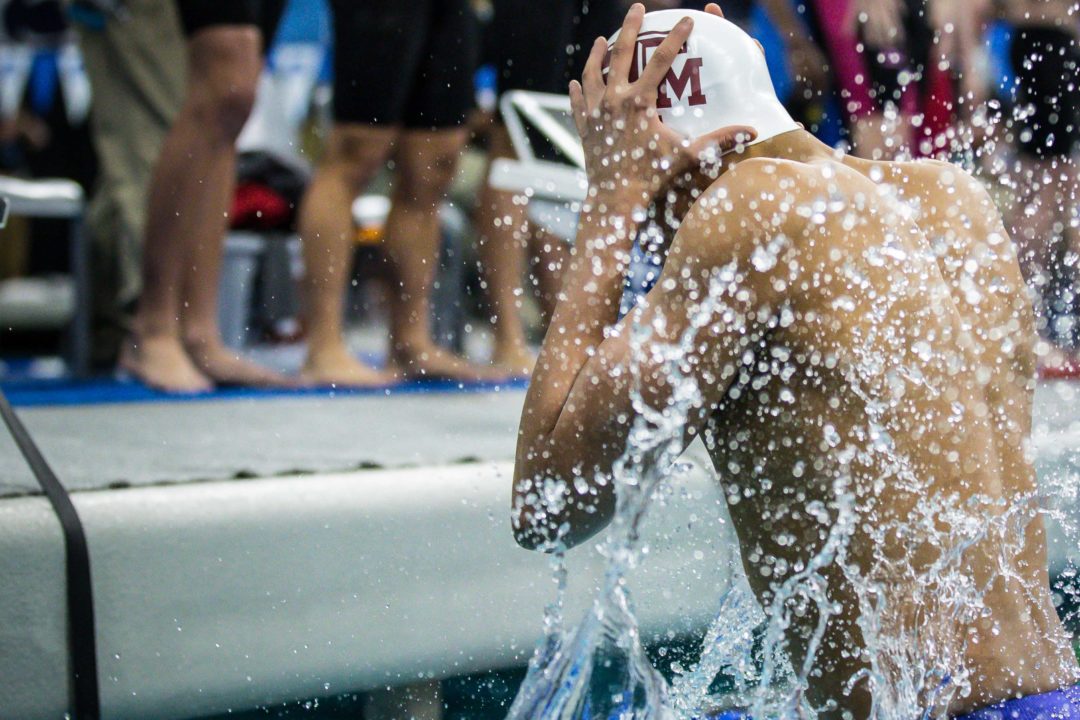We’ll be previewing the top 12 men’s and women’s programs for the 2019-2020 season – stay tuned to our College Swimming Previews channel to catch all 24. Can’t get enough college swimming news? Check out the College Preview issue of SwimSwam Magazine for more in-depth college swimming coverage, including a bird’s-eye view of the flood of coaching changes and our ever-popular rankings of the top 50 individual swimmers in college swimming.
#12 Texas A&M Aggies
Key Losses: Sam Thornton (23 NCAA diving points), Angel Martinez (4 NCAA points, 2 NCAA relays), Steven Richardson (1 NCAA relay)
Key Additions: Jace Brown (TX – sprint free, IM), William Coakley (TX – distance), Andres Puentes (Mexico – breaststroke), Victor Povzner (Canada – diving)
GRADING CRITERIA
We’re unveiling a new, more data-based grading criteria in this year’s series. Our grades this year are based on ‘projected returning points’, a stat of our own making. We started with our already-compiled “no senior returning points” (see here and here), which is effectively a rescoring of 2019 NCAAs with seniors removed and underclassmen moved up to fill those gaps. In addition, we manually filtered out points from known redshirts and swimmers turning pro early, while manually adjusting points for outgoing and incoming transfers and adding in projected points for incoming freshmen with NCAA scoring times, as well as athletes returning from injury or redshirts who are very likely NCAA scorers.
Since we only profile the top 12 teams in this format, our grades are designed with that range in mind. In the grand scheme of college swimming and compared to all other college programs, top 12 NCAA programs would pretty much all grade well across the board. But in the interest of making these previews informative, our grading scale is tough – designed to show the tiers between the good stroke groups, the great ones, and the 2015 Texas fly group types.
- 5 star (★★★★★) – a rare, elite NCAA group projected to score 25+ points per event
- 4 star (★★★★) – a very, very good NCAA group projected to score 15-24 points per event
- 3 star (★★★) – a good NCAA group projected to score 5-14 points per event
- 2 star (★★) – a solid NCAA group projected to score 1-4 points per event
- 1 star (★) – an NCAA group that is projected to score no points per event, though that doesn’t mean it’s without potential scorers – they’ll just need to leapfrog some swimmers ahead of them to do it
We’ll grade each event discipline: sprint free (which we define to include all the relay-distance freestyle events, so 50, 100 and 200), distance free, IM, breaststroke, backstroke, butterfly and diving. Bear in mind that our grades and painstaking scoring formula attempts to take into account all factors, but is still unable to perfectly predict the future. Use these grades as a jumping-off point for discussion, rather than a reason to be angry.
2018-2019 Lookback
A year after a huge breakout season and a rise from 7th to 2nd in the SEC, the Texas A&M men took a young roster through a brutal fall semester of dual meets: a win over Louisville (eventually 5th at NCAAs) was followed by losses to Ohio State (9th), Alabama (7th) and Texas (2nd), before a bounce-back win at the Art Adamson Invite, complete with some massive, nation-leading performances.
Ultimately, the Aggies went backwards in the postseason, taking 4th at SECs and 17th at NCAAs, but that doesn’t fully characterize what was a pretty successful season for the Aggies. The roster was quite young, with two of their top three NCAA scorers brand new to the program. Freshman Shaine Casas was the breakout star in back and fly, and sophomore transfer Mark Theall led the team with 13 NCAA points in the mid-distance freestyles.
Casas’ impact was ultimately a little limited in the postseason, as he took on the butterfly events rather than the backstrokes, where he was actually ranked higher nationally. (Casas has remained adamant that his butterfly is his best stroke, but a breakout summer including a national title in the 100 back might have he and his coaching staff thinking about a lineup change).
Sprint Free: ★★
The sprint frees as an individual discipline are a bit thin for the Aggies. Mark Theall‘s 200 free is the only projected scoring swim, and he’s 9th in our “no senior” scoring. But there are several chances to up that total with a lot of rising depth. Both Adam Koster (19.4/42.3) and Mike Thibert (19.3/43.0) were individual NCAA invitees last year, and Koster actually moves up to 17th in the 50 and 20th in the 100 with last year’s NCAA seniors factored out.
Casas (19.5/44.1/1:33.7) could also be a factor here, but he’s probably sticking to the 200 IM and either the backstrokes or butterflys. On the other hand, rising sophomore Clayton Bobo (19.7/43.2) was a big-name recruit last year, though he only dropped a few tenths in those races. He did go from 1:37 to 1:34 in the 200, though, and should be a three-event scorer down the road – the question is whether it’s now, or another few seasons in.
Distance Free: ★★★
Theall projects as a great scorer here, despite swimming two of his three main events (100/200 free) in the sprint category. As we noted at NCAAs, Theall’s development has opened up a new door for A&M in an event discipline where NCAA success has been extremely limited in past years.
His improvement curve is absurd. Theall was 4:54 in the 500 heading into last year, and cut down to 4:12.70 at NCAAs. He’s the 5th return from last year’s 500 free final, and that’s not even factoring in the improvements he may still have left. The one caveat: Theall was 4:12.70 in prelims but faded to 4:16.0 in finals. He’ll need to dial in his pacing between prelims and finals a little bit more to maximize his points this year.
The mile is what lowers this group’s grading a bit. The team’s best miler last year was Felipe Rizzo at 15:07. It took 14:54 just to earn an NCAA invite last year and 14:46 to score. But Rizzo is only a junior and 15:08 Luke Stuart a rising sophomore, so there are prospects there. 4:23/15:37 incoming freshman William Coakley is a solid addition to the group as well.
Backstroke: ★
Backstroke is one area where A&M could vastly outperform its grade in our projected scoring. It’s a tough area to quantify – in our completely math-based grading, A&M had zero NCAA invitees last year, much less scorers. On the other hand, Shaine Casas finished the year ranked 16th nationwide in the 200 back without even swimming it at NCAAs.
Coming off a long course 52.7 this summer, Casas has to be a backstroke candidate in his sophomore year. On the other hand, we’ve seen Justin Ress types, who are just better at backstroke in long course, and found other ways to contribute in the NCAA.
If Casas swims, he’s a likely scorer. 45.9 and 1:39.8 as a freshman, he’d be a potential A finalist in the 200 and a decent-bet scorer in the 100. He’s probably going to lead off the medley relays regardless: outside of Casas, the next-best Aggie 100 backstroke last year was 47.1 Thibert.
Keep an eye on rising sophomore Ethan Gogulski, who had a great freshman year. He went from 49.0/1:45.0 to 47.7/1:41.3 in the backstrokes last year, and was a tenth out of an NCAA invite in the 200. He’s got some work to do to score at NCAAs (it took 45.3/1:40.8 last year), but there’s definitely a timeline where Casas and Gogulski combine to score 25+ points between the two backstrokes.
Breaststroke: ★★★

Benjamin Walker (photo: Jack Spitser)
Traditionally a strength in College Station for both the men and the women, the breaststrokes should be big-point events for the Aggie men. Benjamin Walker was the SEC champ, and was right in the thick of what was the fastest NCAA 200 breast final in history. He’s one of just five returners from that field. Walker went 1:52.5 last year and was also 52.5 in the 100, dropping from 53.9/1:54.0 the year before and 55.3/1:58.3 as a freshman. Walker will have to continue to improve his short speed to score in the 100 (and to keep pace with the fast-rising Aggie medley relays), but is already projected to score double digits in the 200.
There’s not a ton of depth, though. Tanner Olson (53.2) and Hudson Smith (1:56.2) were the only other SEC scorers. They’re both rising juniors. Sophomore Coco Bratanov has some potential, too. He was 54.4/1:57.4 out of high school, but only made marginal improvements last season. Mexican freshman Andres Puente could be an impact addition, with times of 1:03.1 and 2:16.0 in long course meters.
Butterfly: ★★★

Shaine Casas (photo: Jack Spitser)
Projected as the team’s biggest-scoring event, the butterflys also depend heavily on Shaine Casas‘ event lineup. Casas was 11th at NCAAs in the 200 fly last year, but a veteran field leaves him 6th among returners. He’s also projected to move into scoring range in the 100 fly if he sticks with that event.
Last year, the Aggies got points from senior Angel Martinez, but he’s graduated. So is Mateo Gonzalez-Medina, an SEC scorer. That leaves SEC B and C finalists Luke Stuart and Alberto Gomez as the only returning conference scorers. Gomez is pretty intriguing, going all the way from 1:53.7 to 1:45.6 in the 200 last year and 49.7 to 48.6. Stuart is mostly confined to the 200, but did drop from 1:47.7 to 1:45.0 last year. They’re both fast risers, but still a long ways from NCAA scoring.
IM: ★★★
Casas pretty much singlehandedly floats the IM group here, too. After going 1:42.2 (1:42.7 in finals) last year and taking 13th in the 200 IM at NCAAs, Casas returns as the 5th fastest from last year’s finals. Considering he was just 1:47.5 out of high school, he’s got a serious chance to win the thing next year: the entire top 5 graduate, leaving a 1:41.0 as the top returner, though Cal addition Hugo Gonzalez might be the favorite, one gap year removed from being 1:40-point for Auburn.
The freshman Bratanov is a big talent, too – he was 1:45.2 out of high school, and repeated that time at midseason last year, though he went backwards half a second at SECs.
Walker has a shot to score in the 400 as well. He was 3:42.29 at SECs, but faded badly to 3:47 at NCAAs and missed scoring. His best would have gotten him 10th, but he’ll have to better navigate the NCAA’s condensed, four-day schedule compared to the sprawling five-day SEC meet that allows more rest between events.
Gomez projects as an high-upside possibility, too, after going from 3:51 to 3:47 last year.
Diving: ★★
A&M generally has good divers, and they’ll reload in 2020. But they did graduate 1-meter bronze medalist Sam Thornton, who scored 23 diving points last year. Rising junior Kurtis Mathews is still around, but the diving output will probably be a little down this season with junior Austin Childs projecting as a conference scorer, but probably not an NCAA-level diver yet. Canadian freshman Victor Povzner won a national title on 1-meter last year, and should be a solid pickup.
Relays
The question on the medleys is where to use Casas. The best-case scenario is that Gogulski continues to improve rapidly and takes over the back legs, leaving Casas to fly. Walker should lock down the breaststroke legs, and Koster/Thibert can combine for pretty solid freestyles. In all, unless a non-Casas swimmer steps up in fly or back, these medleys probably remain where they were last year – low-end B final scoring.
The 800 free relay might be the team’s most exciting. Theall split 1:31.9 last year and Casas led off in 1:33.7. Assuming Bobo continues to improve, this relay should have three guys 1:33-or-better. The fourth spot is tough, because Koster can probably split 1:34, but that takes him off one of the medley relays. That might be the best bet, though, with Thibert anchoring the 200 medley. If the fourth split comes through, this is a top 8 relay.
The Aggies will probably have to leave Casas off one of the sprint free relays. Last year, he didn’t swim the 400 free and A&M ended up 18th. That whole relay returns, though, with Theall, Koster, Thibert and Bobo all capable of 42s or better. The 200 free relay is even better: Koster was 18.8 at NCAAs and SECs, and Thibert 18.8 in the conference meet. Bobo went 19.00 at NCAAs. Nowadays, you need a 19-low leadoff man to make the NCAA’s top 8, and it’s hard to say if A&M has that. But if Thibert or Koster is 19.0/19.1 individually, this relay has a real shot to make the A final.
2019-2020 Outlook

Texas A&M men’s team head coach Jay Holmes. Credit: Janna Schulze
It was a very young group in 2018-2019, and things should only improve this year with minimal personnel turnover. The incoming freshman class isn’t super notable, but neither is the outgoing senior group. Casas appears to be one of the NCAA’s next big stars – if he picks the right events for 2020 NCAAs. He has a chance to elevate the relays (and provide coach Jay Holmes with lineup flexibility on the medleys) the way a guy like Coleman Stewart has for NC State.
The freestyle group looks outstanding, and that goes a long way in the relay-centric NCAA. They might be one guy short on a couple relays coming into the season, but there’s really high-ceiling potential here if enough swimmers step up to cover those holes.
All-in-all, we’re projecting a move back up the rankings for A&M this year – perhaps their best finish since 2001 (when they were 11th), with an outside shot at the first top-10 showing since the 1990s.

Yeesh can Shaine Casas carry any harder?
I’m kidding but the sheer versatility on him is phenomenal, with him having the ability to swim almost every relay and basically choose his individual events. I’m hoping that his 100 back continues to show drops because that will be a truly amazing race in the 2021 NCAA’s after Dean Faris’s redshirt year.
Casas has a better chance of making the OT than Farris, imo. Forgive my blasphemy.
Shaine’s improvement curve is mind-boggling, I think you’re right
Hopefully he will red hot in the upcoming ot
2021? Looking forward to this years race between him and Coleman Stewart
Any chance to post the link for last year’s predictions vs actual finishes? Thanks
4:54 to a 4:12?? Is this real or a typo?
It is correct. Theall was a career-best 4:54 when he transferred. Went 4:20 at mid-season, 4:16 at SECs and then 4:12 at NCAAs.
but he was also something like 1:34 already in the 200 free. just didn’t swim the 500 much and for a while
Looks like he had been a 1:36 at UNLV – 1:39 out of high school.
Casas was 52.7 not 52.5 this summer
Ooh you got him…
Still the fastest american ever under 20….
They also have a new diver on board, pun intended. https://staging2.swimswam.com/texas-am-commit-victor-povzner-wins-1-meter-title-at-canadian-diving-nationals/ https://12thman.com/roster.aspx?rp_id=7591
And a pretty solid breaststroker: https://12thman.com/roster.aspx?rp_id=7594
Luke Stuart was a b finalist in 200 fly at sec
Uhh Oh lookin like this team could take the SEC title? Well maybe, just maybe the coonskinned hatted MEN from the Volunteer State will have a thang or two ta say bout that!!!
Nice
Tennessee needs to stop posting so much on social
Media and focus more on practices…. then maybe they would have someone who can say something
How do you figure?
We have Houlie, Connelly, Hiwani, DeCoursey, Garcia and Reilman and a bunch of great divers – ALL of. these guys can A final at SEC and NCAA! Oh yea!!!!
You managed to finagle a fifth year of eligibility for DeCoursey and Reilman?
Ooops you are correct…my bad.
Best of luck lol
Might as well suit up Mel Stewart too while you’re at it….
Upvotes vs. Downvotes real rough on this one
Clown shoes
Yea for all the down voters
What is maybe most ridiculous about the backstroke section is that Casas was 1:39.8 and that was only 16th in the nation last year… dang.
Casas could score 60 pts.
Hmmmm…. I’m going to go with probably not. I don’t see three event wins there.
Nice
He’ll be much faster this year baby.
Aged well